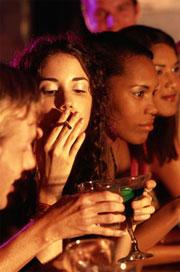 A puff could keep alcohol in your stomach for longer, helping you to stay sober.© Punchstock
A puff could keep alcohol in your stomach for longer, helping you to stay sober.© PunchstockA new study helps to explain why smokers tend to have boozier nights out than non-smokers. The work, done in rats, shows that a heavy dose of nicotine can cut blood-alcohol levels in half. If cigarettes similarly lower intoxication in people, it could mean that smokers need to drink more than non-smokers to get the same buzz.
Many studies have shown that smokers tend to drink more alcohol than non-smokers, and a number of reasons are proposed for this. People who indulge in one habit may be simply more inclined to indulge in another, and socially both habits tend to go hand-in-hand at pubs and parties.
Researchers also know that both nicotine and alcohol trigger a release of the feel-good brain chemical dopamine, but that indulging too much in either habit can breed tolerance to the drugs and reduce this pleasurable reward. So heavy users of one may boost use of the other to help bring their dopamine response back up.
The research suggests that nicotine also directly alters the potency of alcohol in the body. Wei-Jung Chen of Texas A&M University, College Station, first saw hints of this in 1998, in a study of newborn rats given alcohol and nicotine1.
Not half a hangover
To mimic more closely the effect in human drinkers, Chen and his colleagues studied the effects of binge drinking in adult rats. They injected rats' stomachs with a dose of alcohol roughly equivalent to around four or five drinks in quick succession; enough to make their blood alcohol hit double the United States legal driving limit of 0.08%. The team also gave the animals a range of nicotine doses similar to those in the bodies of light, moderate or heavy smokers.
In 'heavy smoking' animals, the nicotine slashed the rats' peak blood-alcohol level, which came about an hour after injection, in half. Blood alcohol of 'moderate smoking' animals dropped by around 30%, and animals mimicking light smokers were not affected. The results are reported in the journal Alcoholism: Clinical & Experimental Research2.
A lower blood-alcohol level means less intoxication: the nicotine-dosed rats were less drunk than their colleagues. But Chen notes that smoking would not ameliorate the other effects of alcohol or prevent a hangover, because the toxic by-products of alcohol breakdown still remain in the body.
Who's for another?
Chen believes that nicotine slows the emptying of the stomach, so more alcohol is broken down and less finds its way into the intestine where it mainly enters the bloodstream. In support of this idea, his group found that nicotine does not affect blood alcohol if the alcohol is injected directly into the abdomen, bypassing the stomach and going straight into the bloodstream.
The researchers have not yet shown that the same thing happens in people, but "now we know it might be a factor" in smokers' tendency to drink more, Chen says.
He says that people should be aware that smoking could reduce the intoxicating effects of a drink and make some reach for an ill-advised second, third or fourth.
Chen points out that the study may have other, worrying implications. If nicotine does slow stomach emptying, then it may also affect the rate at which other prescription or over-the-counter drugs are absorbed, and the overall impact of the drug.
ADVERTISEMENT
"A lot of scientists focus on one drug, but in reality people are using both drugs together so we have to study them together," says Amir Rezvani, who studies nicotine and alcohol at Duke University Medical Center in Durham, North Carolina.
Visit our sobersupdrunkrats.html">newsblog to read and post comments about this story.
